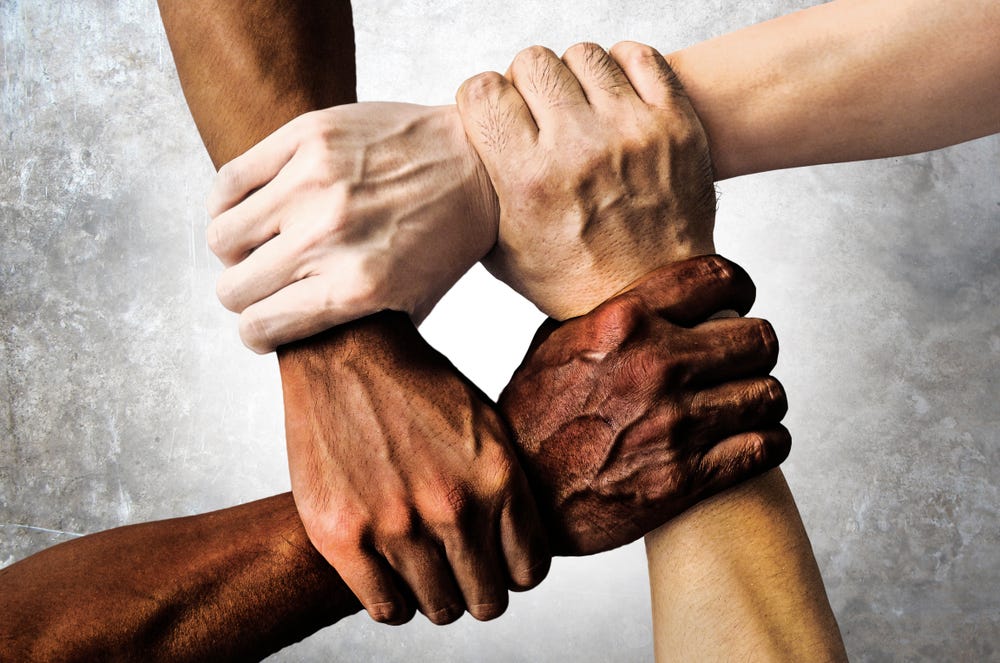E-Pluribus | October 12, 2021
Cancelling Othello, what ultimately divides us, and a closer look at a new approach to anti-racism.
A round up of the latest and best writing and musings on the rise of illiberalism in the public discourse:
Cathy Young: Unsafe in Michigan
While Cathy Young says there may be some legitimate complaints about Laurence Olivier’s 1965 portrayal of Othello, the reaction to University of Michigan professor Bright Sheng’s screening of the film is beyond the pale. Between the unjust tarring of Sheng’s motivations and kid glove treatment of oversensitive students, the entire incident epitomizes campus cancel culture that trades actual educational opportunities for short-term political and social justice point-scoring.
Sheng’s troubles began when he screened the film on September 10 as part of an Othello project, focusing on the Shakespeare-to-Verdi adaptation and the process of forming an opera libretto. Apparently, some students complained right away, because Sheng sent an apology email shortly after the end of class, noting that the casting and the portrayal of Othello were “racially insensitive and outdated.” He also canceled the project.
I can’t judge that apology email, since I the whole thing isn’t publicly available. If Sheng apologized for showing the film in class, I don’t think he needed to. It would have been enough to acknowledge the objections and discomfort and say that he should have introduced the screening with a disclaimer. It would have also helped to throw in a reminder that people who study art should know how to deal with classical art that is offensive by modern standards. And dropping the entire Othello project was totally unnecessary.
In any case, that should have been the end of it. But, obviously, it wasn’t.
The offended students pressed on. Five days later, David Gier, dean of the School of Music, Theatre & Dance, sent out an email apologizing for the incident and stating that “Professor Sheng’s actions do not align with our School’s commitment to anti-racist action, diversity, equity and inclusion.” The email also said that the incident had been reported to the Office of Equity, Civil Rights, and Title IX.
Read it all here.
Andrew Klavan: At the Heart of Our Divisions
Once a third rail in politics, socialism has seen its stock rise in the U.S. in recent years, particularly in the form championed by Congress’s Squad, a.k.a. Democratic Socialism. Andrew Klavan at City Journal writes, however, that the utopian ideal of a “benevolent state dedicated to the common good” cannot mask the underlying immorality of socialism’s necessary authorianism.
Socialism is immoral because it rests on a benign fantasy that masks a malignant truth. The fantasy is that a nation’s production, distribution, and wealth can be entrusted to a benevolent state dedicated to the common good. There is no such state. There are only people with power. Long centuries of constitutional restraints have schooled these naked apes in the habits of decency. But as the restraints weaken, the habits fall away. Not sometimes—always. “Power tends to corrupt, and absolute power corrupts absolutely.” Socialism, which centralizes power, leads to oppression and human misery. Like the t-shirt says, you can vote your way in, but you have to shoot your way out.
[…]
Because of socialism’s repeated failures, the supporters of this bad idea are left without arguments. Instead, they have retreated into “critical theory,” insult, and violence. Critical theory, generally speaking, is the dishonest strategy of relentlessly criticizing the flaws and history of freedom and capitalism in the hope that listeners will conclude that solutions must come from a more powerful central government. Insult silences reasoned arguments with name-calling. If you disagree, you’re racist, sexist, phobic, or otherwise hateful and must be shunned and canceled. Violence comes in the form of riots (“mostly peaceful demonstrations,” in corporate media-speak), Maoist street thuggery (“anti-fascism”), and the hobbling of the police, which ensures spiraling crime (“racial justice”).
[…]
Toward the political center, where I suspect most American hearts reside, conservatives and liberals have valid points to make. Conservatives know the Burkean truths that liberty rests on tradition and morality and is of such great value that it is worth allowing individuals to do and say some evil rather than attempting to transform them into “mere machines and instruments of political benevolence.” Liberals understand that traditions and traditional morality can sometimes amberize historical injustices, and that wholly unfettered capitalism can lead to extremes of inequality, cronyism, and corruption.
Read the whole thing.
Nick Gillespie: A Different Approach to Anti-Racism
In August, we featured a podcast interview with Chloé Valdary conducted by Reason’s Nick Gillespie. The interview transcript now appears in November’s issue of Reason and is available here. Valdary’s brand of anti-racism cuts against the present day grain of such programs, focusing less on guilt and shame and more on human nature and pitfalls and foibles we all share.
[Chloé Valdary’s] approach to anti-racism is different from that of best-selling leftist consultants such as Ibram X. Kendi and Robin DiAngelo. Instead of pushing people to feel guilty and complicit in everything from minor slights to systemic racism in workplace trainings, Valdary's company, Theory of Enchantment, wants participants of every background to learn to be more curious about and compassionate toward those who are different from them. "This attempt to correct injustice is laudable," she wrote last year in USA Today of the protests over the police killing of George Floyd that erupted across the country, "but the work of anti-racism must be rooted in the moral ethic of love and acknowledge the profound sacredness of human beings."
Valdary uses popular culture to teach about age-old ideas. Unsurprisingly, many people seem to prefer her positive curriculum over ones that insist they feel shame for having been born and raised a certain race. Valdary is frequently asked to speak at universities and corporations. In July, she spoke with Reason's Nick Gillespie via Zoom about the problems with most modern "diversity, equity, and inclusion" programs and why she thinks her alternative stands a better chance of breaking down barriers.
[…]
[Valdary:] When we talk about the concept of supremacy, supremacy is not just a racial concept. If someone cuts me off in the street and I begin to see that person as less than me, to see myself as greater than or better than that person, I have entered into a supremacist superiority complex, right? And when I'm doing that, I'm basically acting out of insecurity. I'm using supremacy as a defensive mechanism, because I am operating out of a sense of lack. So all the exercises in the Theory of Enchantment help the practitioners develop tools to deal with their insecurities—because all human beings have insecurities, unless you're the Buddha or something—so you'll be less likely to overcompensate for them by being attracted to supremacist ways of thinking. And again, it's not strictly racial. It's a fundamentally base human instinct that we get looped in as a defensive mechanism.
Read it all.
Around Twitter
Andrew Sullivan on Australia’s anti-COVID measures and a “free” society:
Some excerpts of a thread from Jay Kang on an illiberal trend in publishing:
“Accountability” or “cancelling”? The case of Britain’s University of Sussex professor Kathleen Stock takes another turn:
And finally, make of this what you will:










